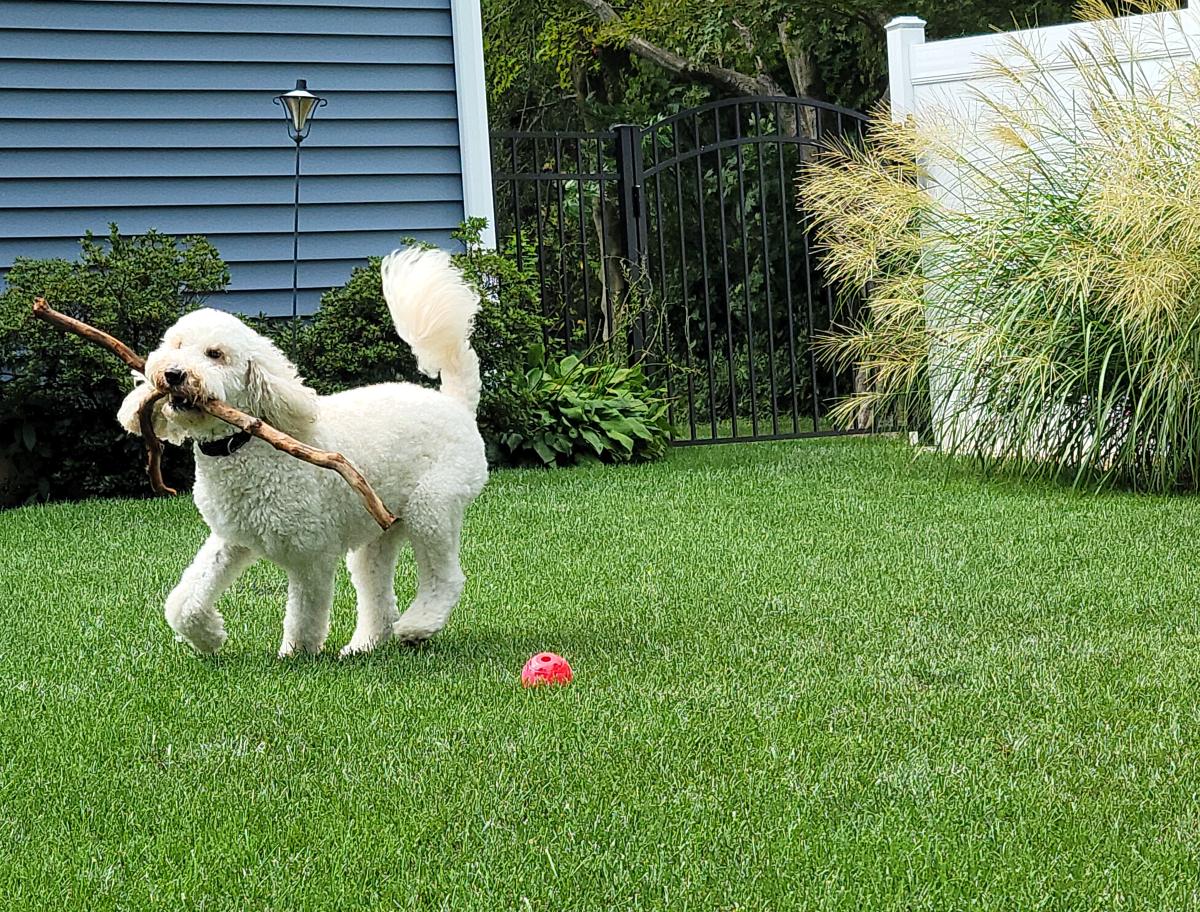
It’s that time of year again – when our thoughts turn to routine lawn care. After all, the weeds are back out in full force, and trouble spots crop up every time we mow.
We wander through the garden aisles, comparing endless shelves of products. We listen patiently to the friendly, charming young men who show up at our doors to disapprove of our lawns and then offer their pricey weeding and pesticide services.
We frown over the list of scary sounding chemical ingredients in fertilizers, weed killers, and pesticides. We think about our furkids, who spend so much time walking or playing on our lawn. Is this stuff really safe?
The smiling salespeople will tell you yes. But the answer is unfortunately, no. They aren’t safe for your pets, or even your lawn. And the problem is not new.
“The traditional lawn care industry has looked the same for the past 40 years,” notes Craig Elworthy, founder of Lawnbright, an organic subscription lawn care service. “The choices are limited; either sign up for an expensive lawn care service, or walk into a big box store and stare blankly at a giant rack of fertilizers. Each option is wasteful, bad for the environment, and bad for your lawn. And many homeowners also worry about the chemicals in lawn care when allowing pets to play on the lawn.”
Homeowners are right to be concerned; skin exposure to the chemicals in pesticides can cause a host of problems in pets, including swelling, irritation, and allergies. Ingesting them can cause anything from an upset stomach to vomiting and seizures. Some at-risk pets can even die.
Even worse, research has linked some pesticide and fertilizer ingredients to cancer, liver and kidney disease, and nerve damage.
Chemical residue hangs around even after grass dries. If your pet plays, rolls, or runs around the lawn, then licks his paws or his fur, he can ingest it. Even a small amount of chemicals presents risk. Toxins can accumulate in a pet’s body over each lawn treatment, causing illness down the road.
So, can people have a healthy lawn and healthy pet?
Actually, yes!
Here are some steps you can take to help make that happen.
Healthy plants need less pesticide
Healthy plants start with rich, highly nutritious soil. Have your soil tested, if needed, and use organic options to build it up. Use hardy grass that’s appropriate for your location, use irrigation that works naturally with your landscape, and choose native plants for your garden.
Choose natural options whenever possible
In many cases, home remedies are as effective as chemical treatments. One popular recipe for homemade weed killer involves simple ingredients you can almost certainly find in your kitchen right now. Combine one gallon of white vinegar, one cup of salt, and one tablespoon of non-toxic liquid dish soap. Put in it a spray bottle, and shazam. Fan favorites for non-toxic dish soaps include Truly Free and Seventh Generation. This solution works best when the sun is out, and it does kill weeds and grass, so use it with caution. When all else fails, you can always pull weeds by hand – it’s good exercise and good therapy!
When it comes to fertilizer, compost and raw manure are excellent all-natural go-to options. Grass clippings also act as a natural mulch and put vital nutrients back into your lawn.
If you want ready-made remedies to keep your lawn lush and weeds at bay, safe, effective commercial products are available. Always do your homework on the ingredients in these options, as some are not as natural or helpful as the packaging claims.
Think outside the professional lawn care treatment box
New, innovative services that offer safe, effective lawn treatments are making inroads in the traditional lawn care industry. Lawnbright is a lawn care subscription that delivers natural, pet-safe lawn care right to your door throughout the season . They offer natural, organic, pet-safe products with ingredients like sea kelp, corn, and humic. Lawnbright will also test your soil and size your lawn to customize your treatment, and deliver the products to your door on a subscription basis.
Elworthy had pets, kids, and the environment in mind when he founded Lawnbright. “I hated having to keep my kids and pets off the lawn for hours or even days at a time,” he says. “Especially in the last couple years, when we needed our outside spaces more than ever. We also have a lot of wildlife around my house and live near a stream, so it was important not to disturb the larger ecosystem around us.”
Love your lawn, flaws and all
An important thing to remember is that yards aren’t museum artwork. They’re dynamic ecosystems that are full of life and unique character. If you can let go of your vision of perfection and love your lawn for what it is, you can have healthier grass and soil– and a healthier furkid.